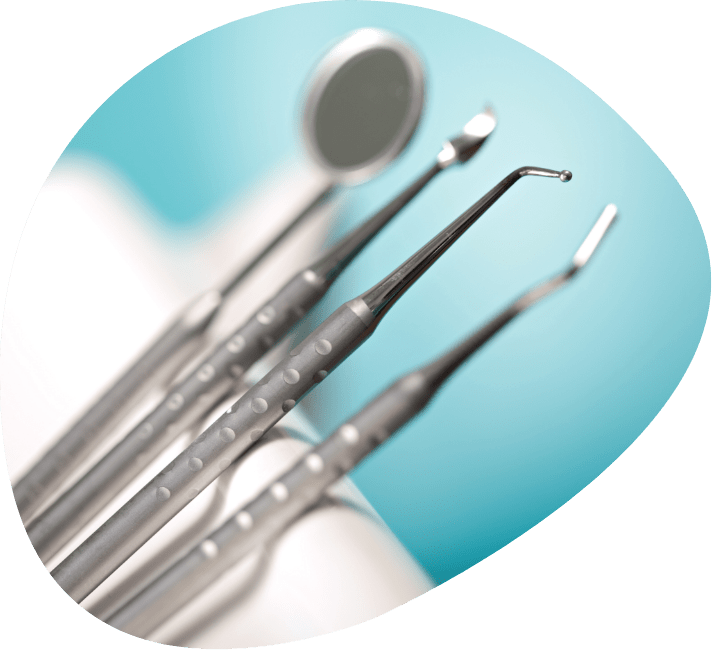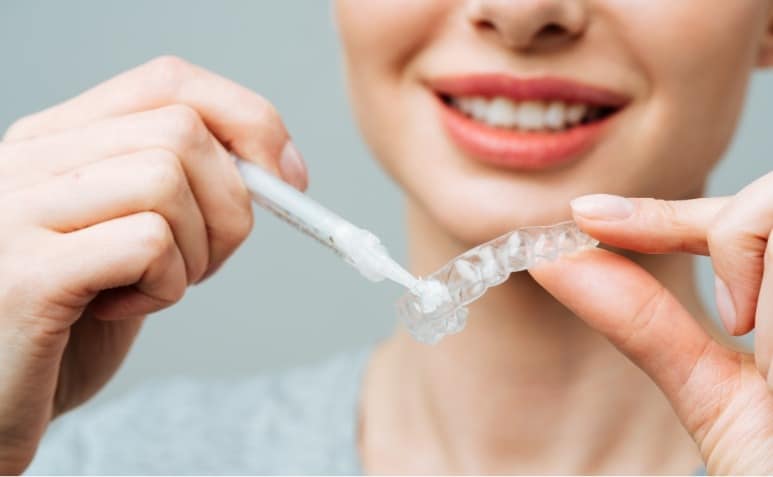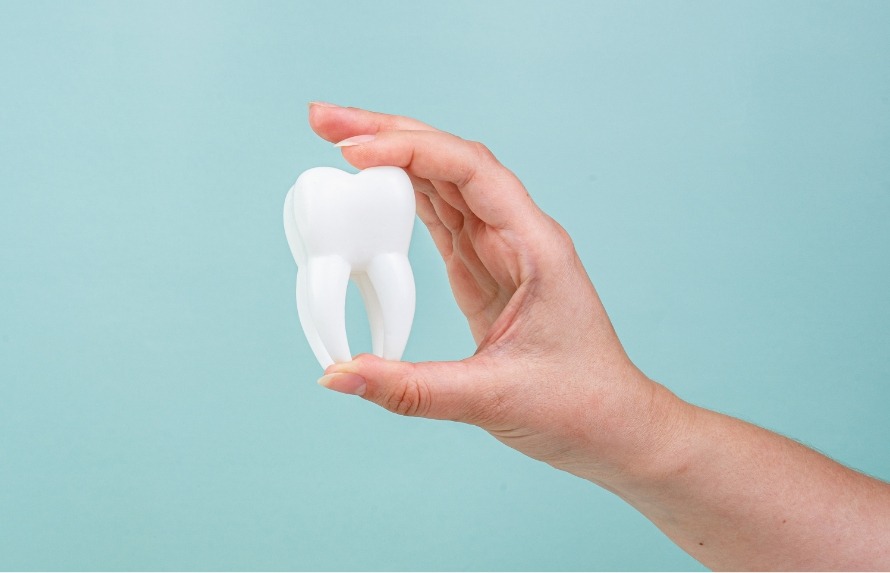We offer important post-operative advice

Here are a few tips to help you take a positive approach to your dental procedures and take the right action at the right time, especially in the post-operative phase.


Teeth whitening at home
Tips for successful treatment
- Before your daily treatment, take the time to brush and floss your teeth thoroughly. This will help you remove as many deposits as possible from the surface of your teeth and from the spaces between your teeth;
- Don't eat, drink or smoke while wearing aligners;
- Cigarettes should be avoided throughout the whitening treatment and for two weeks afterwards. The same applies to dark foods and beverages likely to stain teeth, such as red wine, coffee, black tea and berries;
- If the gutter overflows, there may be a slight stinging or burning sensation in the gums, as well as discoloration of the soft tissues (inside lip, gums). These effects normally resolve within minutes or hours. To avoid them, it's important to follow the recommendations (amount of product, exposure time) and clean up any excess gel before inserting the aligners.
Dental extractions
Convalescence and general precautions
- Allow yourself some time to rest on the day of the operation. Avoid any physical activity or activity requiring strength for 48 hours;
- Wait until bleeding has stopped before eating. However, it's best to eat cold, liquid foods (avoid heat) in the first few hours. Your dentist will probably recommend a soft diet for a few days. Follow it until you're comfortable enough to start eating more normally again. Be careful with hot and spicy foods during the healing period;
- Don't smoke or drink alcohol in the days following surgery. These products interfere with tissue oxygenation and blood circulation, and could therefore slow healing;
- Avoid spitting and rinsing your mouth with liquid for 24 hours after surgery to avoid putting pressure on the stitches. For the same reason, don't use a straw to drink;
- You can resume your normal oral hygiene routine on the day of surgery. However, be sure not to brush directly over the extraction site, and to use a brush with very soft bristles.

Symptom control
Bleeding : Post-surgical bleeding is completely normal and usually resolves within minutes or hours of surgery. To help control bleeding, apply pressure to the operated site(s) by biting into one of the cotton pads you've been given. Change it every thirty minutes, or when the pads become soaked with blood. If bleeding persists, you can use a lightly moistened tea bag or gauze pad to help stop it.
It's also normal for saliva to remain stained for some time. This is nothing to worry about, unless heavier bleeding resumes after you've stopped.
It's also normal for saliva to remain stained for some time. This is nothing to worry about, unless heavier bleeding resumes after you've stopped.
Pain : In the hours and days following extraction, pain is normal. It can be reduced by taking prescribed painkillers or over-the-counter analgesics (Tylenol or Advil). If the pain persists for more than three days, increases rather than decreases, or painkillers have no effect, contact us immediately.
Swelling and bruising : To reduce the swelling that usually occurs, place ice on your cheek for periods of 20 minutes per hour for the first 24 hours. Swelling should then peak and gradually diminish. If a bruise appears, it too should go away after five to seven days.
Medication : If your dentist has given you painkillers, take them as directed, but only if necessary. You may also be prescribed antibiotics to limit the risk of infection. If this is the case, it's important to take them as prescribed and follow the full course of treatment, even if symptoms have subsided.
Healing aid : To aid the healing process, it's important to control bacterial action. To do this, rinse your mouth 3 times a day with warm salted water (1/2 tsp. salt in 1 cup of water). Start the day after surgery and continue until your mouth is completely healed.

Installing a crown or bridge
Diet : you don't need to change your eating habits after the installation of a crown or bridge. However, you should avoid hot beverages (coffee, tea, etc.) while the anesthetic is taking effect. Don't eat sticky or hard foods (chewing gum, sweets, popcorn, nuts, etc.) and try to chew on the opposite side of your mouth for a few days.
Dental hygiene : you can brush and floss normally after the installation procedure. However, be sure to go easy on the crown or bridge.
Sensitivity and pain : it's normal for the crowned tooth or teeth to be sensitive for a few days. However, this sensitivity should not persist or develop into actual pain. So it's important to call us if the tooth or teeth remain sensitive after several days, or if they hurt to the point where you have difficulty closing your mouth or chewing normally.
Temporary crown or bridge : If the restoration comes loose, call us right away so we can put it back in place. To help prevent this, be careful when flossing. Floss from the side rather than pulling toward the tips of your teeth;
Dental hygiene : you can brush and floss normally after the installation procedure. However, be sure to go easy on the crown or bridge.
Sensitivity and pain : it's normal for the crowned tooth or teeth to be sensitive for a few days. However, this sensitivity should not persist or develop into actual pain. So it's important to call us if the tooth or teeth remain sensitive after several days, or if they hurt to the point where you have difficulty closing your mouth or chewing normally.
Temporary crown or bridge : If the restoration comes loose, call us right away so we can put it back in place. To help prevent this, be careful when flossing. Floss from the side rather than pulling toward the tips of your teeth;
Book an appointment
Call us at (450) 912-1688 to schedule your next visit. You can also fill out our online appointment request form. We'll get back to you as soon as possible to offer you a suitable time slot, whether you already have a file with us or are looking for a new clinic!